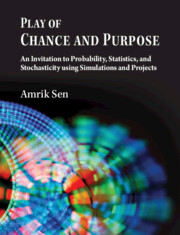Refine search
Actions for selected content:
997 results in Applied probability and stochastic networks

Networks
- Probability and Statistics
- Coming soon
-
- Expected online publication date:
- April 2026
- Print publication:
- 30 April 2026
-
- Book
- Export citation
Color Plates
-
- Book:
- Play of Chance and Purpose
- Published online:
- 13 January 2026
- Print publication:
- 28 February 2026, pp 295-298
-
- Chapter
- Export citation
Appendix 1 - A Brief Tour of Matrices
-
- Book:
- Play of Chance and Purpose
- Published online:
- 13 January 2026
- Print publication:
- 28 February 2026, pp 237-264
-
- Chapter
- Export citation
Index
-
- Book:
- Play of Chance and Purpose
- Published online:
- 13 January 2026
- Print publication:
- 28 February 2026, pp 287-294
-
- Chapter
- Export citation
1 - Thinking in Probability
-
- Book:
- Play of Chance and Purpose
- Published online:
- 13 January 2026
- Print publication:
- 28 February 2026, pp 1-26
-
- Chapter
- Export citation
6 - Prediction and Time Series Modeling
-
- Book:
- Play of Chance and Purpose
- Published online:
- 13 January 2026
- Print publication:
- 28 February 2026, pp 179-214
-
- Chapter
- Export citation
Dedication
-
- Book:
- Play of Chance and Purpose
- Published online:
- 13 January 2026
- Print publication:
- 28 February 2026, pp v-vi
-
- Chapter
- Export citation
Appendix 2 - A Breeze through Matlab
-
- Book:
- Play of Chance and Purpose
- Published online:
- 13 January 2026
- Print publication:
- 28 February 2026, pp 265-286
-
- Chapter
- Export citation
Acknowledgments
-
- Book:
- Play of Chance and Purpose
- Published online:
- 13 January 2026
- Print publication:
- 28 February 2026, pp xxix-xxx
-
- Chapter
- Export citation
4 - Continuous Time Markov Chains and Queues
-
- Book:
- Play of Chance and Purpose
- Published online:
- 13 January 2026
- Print publication:
- 28 February 2026, pp 115-144
-
- Chapter
- Export citation
5 - Statistical Experiments
-
- Book:
- Play of Chance and Purpose
- Published online:
- 13 January 2026
- Print publication:
- 28 February 2026, pp 145-178
-
- Chapter
- Export citation
Preface
-
- Book:
- Play of Chance and Purpose
- Published online:
- 13 January 2026
- Print publication:
- 28 February 2026, pp xxv-xxviii
-
- Chapter
- Export citation
Frontmatter
-
- Book:
- Play of Chance and Purpose
- Published online:
- 13 January 2026
- Print publication:
- 28 February 2026, pp i-iv
-
- Chapter
- Export citation
Contents
-
- Book:
- Play of Chance and Purpose
- Published online:
- 13 January 2026
- Print publication:
- 28 February 2026, pp vii-xiv
-
- Chapter
- Export citation
2 - Probability Distributions
-
- Book:
- Play of Chance and Purpose
- Published online:
- 13 January 2026
- Print publication:
- 28 February 2026, pp 27-90
-
- Chapter
- Export citation
List of URL Links to Data in CSV Format
-
- Book:
- Play of Chance and Purpose
- Published online:
- 13 January 2026
- Print publication:
- 28 February 2026, pp xxiii-xxiv
-
- Chapter
- Export citation
7 - Glimpses of Multivariate Statistics
-
- Book:
- Play of Chance and Purpose
- Published online:
- 13 January 2026
- Print publication:
- 28 February 2026, pp 215-236
-
- Chapter
- Export citation
List of Table and Figures
-
- Book:
- Play of Chance and Purpose
- Published online:
- 13 January 2026
- Print publication:
- 28 February 2026, pp xv-xxii
-
- Chapter
- Export citation
3 - Discrete Time Markov Chains
-
- Book:
- Play of Chance and Purpose
- Published online:
- 13 January 2026
- Print publication:
- 28 February 2026, pp 91-114
-
- Chapter
- Export citation

Play of Chance and Purpose
- An Invitation to Probability, Statistics, and Stochasticity Using Simulations and Projects
-
- Published online:
- 13 January 2026
- Print publication:
- 31 March 2026
-
- Textbook
- Export citation
